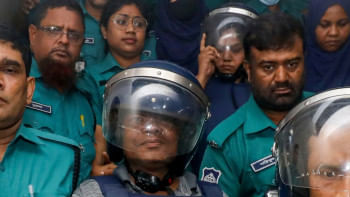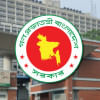Government must make itself available to questions from the press

I am mindful of the risk that criticism even from a friend keen to see the interim government (IG) succeed could be misrepresented by those who would rather the IG failed. Such people will find nothing in the following to cast doubt on the legitimacy of the IG. Rather, the remarks here are offered in the spirit of constructive advice with a view to helping the IG accomplish its goals.
Democratic governments are held accountable by popular elections, parliamentary scrutiny, and the review of independent institutions such as the courts. Beyond such features, one is hard pressed to find any practice of democracy that does not include the rigours of a vibrant, free press.
At the time of writing this, there are only three members of staff in the press office of the chief adviser. The office's woeful under-resourcing alone, rather than failures of staff, could explain its shortcomings.
Instead of acting as a passive conduit for government bulletins, a press office should take the initiative on communications, anticipating needs and acting accordingly. Consider the IG's announcement on September 17 to grant temporary magistracy powers to the military. Without reasons for such a grant of powers, the announcement naturally raised concerns. The home affairs adviser did subsequently provide further explanation in a speech to new army recruits, but that came two days after news media had reported the story and damage had been done.
Examples of "small" avoidable errors are plentiful; their impact cumulatively, however, is far from small. Here is another example. After first supporting the IG's resolve to reform the constitution, BNP leadership was reported to say, on September 22, that reforms should take place only under an elected government. This came after earlier reported claims that the public would not tolerate an IG staying in place for too long. The press office should have grasped the significance of the BNP statement, not least as a test of the traction that calls for elections might enjoy. A press office with initiative would quickly have landed on a readily available response to provide journalists. With the law adviser's help, the office could have drafted something along such lines as: "The IG shares the BNP's concern for democratic endorsement of a constitution. Constitutions, everywhere, are typically approved by constitutional assemblies and ratified by parliaments. The IG respects the need for the people, directly or through elected representatives, to ratify a constitution." Such a response would not have bound the IG and, moreover, it would have sent a cautionary signal to all those who would call for elections prematurely. As a bonus, it would have reframed the BNP's own statement.
Perhaps the press office's shortcomings are most vividly illustrated by the CA's recent interview with Voice of America and the subsequent furore. Though first reported on October 3, the interview itself took place on September 27. Presumably, a press officer was present (and made a separate recording), as should be the case at all media interviews.
After referencing the destruction of Bangabandhu Memorial Museum and the cancellation of the national day of mourning, while further noting that Sheikh Mujib had long been recognised as the father of the nation, the interviewer asked "What's the viewpoint of your IG?"
To say that the CA's answer was regrettable is hardly controversial. In hindsight, I imagine he wishes he had worded things differently. His reply was: "You're talking about the past. Apparently, you don't remember that a mass uprising has since taken place. You're speaking as if it never happened. You need to see what's happening in this new situation. You do not seem to have any questions about how many students have sacrificed their lives, why they sacrificed their lives. First, we must admit that they, the students, said that we have pushed a reset button. The past is gone for sure. Now we will build up in new way. People also want that. And this new way means we must bring reforms."
What gave rise to controversy, specifically, were the words "...we have pushed a reset button. The past is gone for sure." My own view is that the CA did not intend to be understood as promoting revisionist history or Stalinist photographic airbrushing of a persona newly deemed non gratis. But it is unreasonable to expect everyone to read his words as I did: on its face, the text is indeed troubling.
Moreover, the controversial words aside, the rest of the CA's response to the question reflects a lack of having been prepared by his press team. His tone is defensive, bordering on belligerent, which does not look good at all. My attention here is not on what the CA said but on what the press office failed to do both beforehand and afterward. Professor Yunus is not a seasoned politician emerging from the trials of political interviews over long years. He is an academic. His team should have warned him that, although he will be celebrated by leaders gathered in New York for the UN general assembly, he should not expect an easy ride in every press interview. They should have cautioned him that criticising a journalist for the choice of questions leaves the impression of someone defensive and unfamiliar with accountability. Under the old regime, of course, Awami League politicians all but wrote the questions put to them at press conferences. But that is not the case wherever there is a free press—choice of questions is the interviewer's prerogative.
Equally important, the team should have primed the CA on the cardinal rule of political interviews—do not answer a question, when it is wise not to do so, but instead pivot to your own talking point. And it is never wise to answer a question that has raised your ire and made you feel defensive, in the way the question quite evidently had Professor Yunus. His own closing words indicate what the focus of his answer should have been: "...we must bring reforms."
No doubt other things were also at play. For instance, we all recognise a prevailing culture of deference towards "superiors," that inhibits constructive criticism, including in private, which, in turn, leaves people in leadership positions unaccustomed to awkward questions.
A competent communications staffer present at the interview would spot right away that the CA's answer to that one question could well cause problems. The press team should have anticipated the likelihood of a social media outcry, with a response at the ready, if required upon the interview's publication a week later. Instead, it took another seven days following publication for the team to react on October 11. Even then, it did so by releasing a written statement rather than through a press conference, where, by fielding questions, it might have hoped to put matters to rest, not just in the media but in people's minds. None of this is how a serious communications operation is run.
The press office has several functions for which it must be adequately staffed. Clearly, it must guide senior IG officials on how to field questions. More generally, it must anticipate reactions to its own announcements; it must be fleet of foot; it must enlist any part of the IG necessary to inform a response to news and events; and it must have the weight of the CA behind it to promptly receive whatever input it needs from others in the IG.
But there is another critical function, one the press team has yet to serve with enough regularity or effectiveness, a function that brings into focus the unique nature of this administration. As discussed above, there is no doubt the IG has a clear mandate. But a mandate does not constitute accountability. And, in the justifiable absence of parliament, there are scarcely any sources of public accountability aside from the press. The press office should be holding press conferences, taking questions from journalists regularly and frequently, even daily—why not? There is no shame in not having answers always at hand; when necessary, answers can be provided later. But the press has to be respected as an institution by which the government is held accountable by the people. Until elections are called and parliament restored, it is arguably the only such institution.
This insight has another important consequence, to which I now turn. As was to be expected, August saw a flurry of media reports of advisers making bold and broad statements of principle—how this or that practice must stop. But lofty platitudes have continued into October amid an endless merry-go-round of roundtables and conferences, with senior IG figures all too often in attendance. One can be forgiven for wondering if some in the IG have failed to grasp a simple fact: they have ceased to be civil society campaigners making demands of the government; in fact, they are the government.
Most of the advisers are drawn from the NGO or academic sectors, where conferences and roundtables are routine. Such roundtables have a virtue in attracting news media for the purpose of legitimate advocacy work. But governments do not need roundtables to attract attention. Moreover, it should be apparent to anyone who's attended any—and, God forgive me, I have attended too many—roundtables hardly ever yield new insights.
Too much of what we hear about government decision-making is through news reports of roundtables. Even if the government were elected, this would be undemocratic, but it is all the more so given that the IG is not elected, and since such forums are invariably gatherings of the Dhaka elite, who are all too often found at the same dinner parties and weddings.
Governing is about getting things done practically and is not the same as NGO advocacy. Advisers should attend roundtables judiciously, turning instead to press conferences and fielding questions from journalists. Press conferences are the right forum for announcing developments in government policy.
One notes, by the way, that where press conferences are routinely held, with press officers taking questions, news media will put their best journalists on the beat, for the obvious reason that good questions will yield material worth reporting. And this, incidentally, will raise the standard of accountability. Accountability is not to be feared but embraced. It makes each of us better, as well as being better for those to whom we are accountable. Besides, shouldn't we act like the change we want to see? If the IG wants governments to be accountable, it can act now.
Roundtables can go ahead but without advisers, and conveners can make written submissions to the IG, with the benefit of discussions already in hand. Advisers and other government officials must be freed from the terrible time-sink of these roundtables. If I mention Dhaka's horrifying perpetual traffic jam and the hours it takes to travel to and from any venue, it is to underline the fact that time is a precious commodity depleting by the day, and especially precious to an IG with an indeterminate future.
Bangladesh needs a properly resourced and responsive IG press office, one that regards its audience as the nation and not the elite. Making itself routinely answerable to a free press is the pre-eminent means, until elections, by which the government can deliver effective accountability. Without accountability, we will all, in time, inevitably wonder: what the heck is the government actually doing? The cumulative effect of inadequate announcements and infrequent press conferences, where questions are taken, will be the draining of trust and faith, and growing doubt in the IG's capacity to deliver. There is still time to fix all this. But how much time is anyone's guess.
Zia Haider Rahman, a former international human rights lawyer and head of research at Transparency International Bangladesh (TIB), is the author of the novel In the Light of What We Know. His X handle is @ziahaiderrahman.
Views expressed in this article are the author's own.
Follow The Daily Star Opinion on Facebook for the latest opinions, commentaries and analyses by experts and professionals. To contribute your article or letter to The Daily Star Opinion, see our guidelines for submission.

 For all latest news, follow The Daily Star's Google News channel.
For all latest news, follow The Daily Star's Google News channel. 










Comments